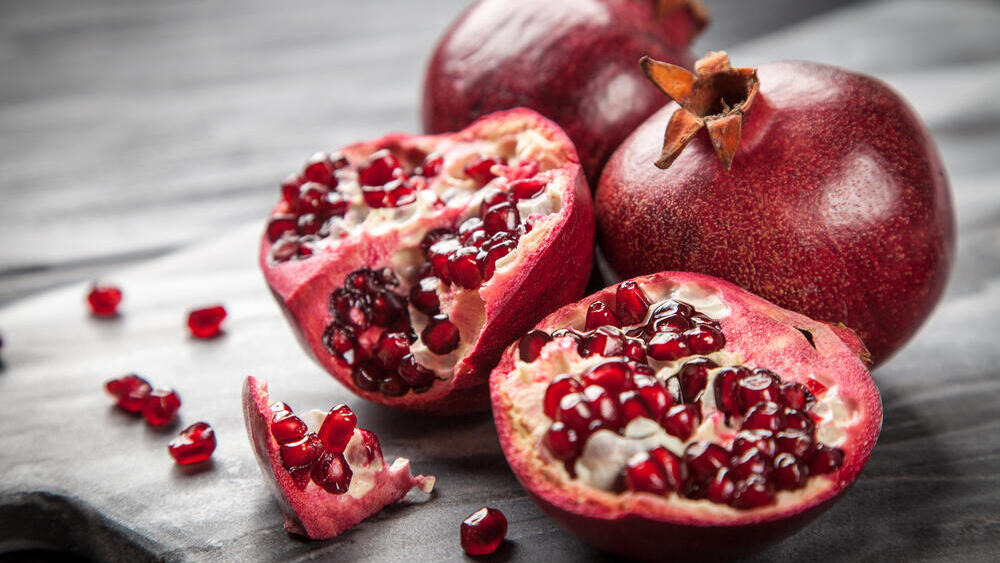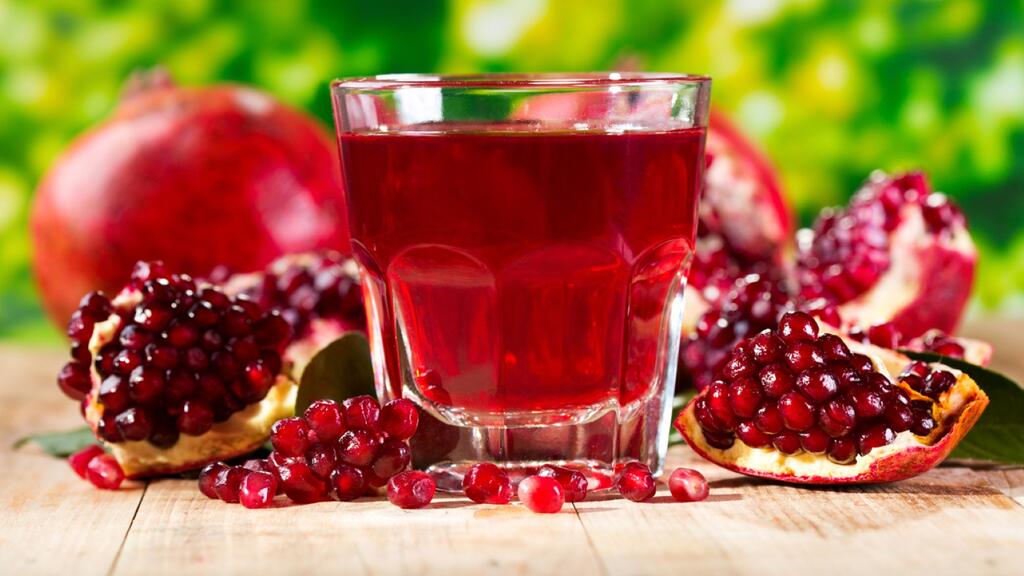Getting your Trinity Audio player ready...
The pomegranate is one of the seven species and symbolizes beauty, abundance, and fertility. Beyond that, it is one of the healthiest fruits available, and there's no need to wait for the Jewish New Year to enjoy it.
Notable benefits of pomegranate
Rich in Antioxidants: The red pigments of pomegranates are packed with powerful phytochemicals that help the body combat free radicals. These oxidizing agents come from everyday exposures like air pollution, smoking, soot, pesticides, certain food products, and even sunlight. An excess of free radicals can contribute to various diseases, including diabetes, hypertension, cancer, atherosclerosis, cardiovascular diseases, cataracts, Alzheimer's, and accelerated aging. The prominent phytochemicals in pomegranates include anthocyanins, which give the fruit its vibrant color, and tannins, both of which contribute to its impressive health benefits.
High in Polyphenols: These compounds are known to inhibit the growth of various cancer cells, prevent atherosclerosis, improve blood flow, lower LDL ("bad") cholesterol levels, and reduce blood pressure. A study comparing the antioxidant activity of pomegranate juice with green tea and red wine—both known for their antioxidant properties—found that pomegranate juice has three times the antioxidant capacity.
In addition to polyphenols, pomegranates are rich in vitamins C, E, and B, as well as folic acid, vitamin K, zinc, and potassium:
Vitamin C: Essential for immune function, reducing the risk of heart disease, stroke, and cancer, and slowing aging processes. It is crucial for collagen production, which plays a significant role in wound healing and improves iron absorption to help prevent anemia.
Vitamin E: A vital antioxidant that lowers the risk of heart disease.
B Vitamins: Necessary for the metabolism of fats and proteins and for the proper functioning of the nervous system.
Vitamin K: Important for blood clotting and bone health.
Folic Acid: Supports nervous system function, reduces the risk of heart disease, and may help maintain brain function and bone strength.
Potassium: Essential for the proper functioning of all cells, tissues, and organs, contributing to bone health and muscle function, while also helping maintain healthy blood pressure and reducing the risk of cardiovascular diseases.
Zinc: Crucial for immune system activity and wound healing.
Pomegranates are low in calories and fat but rich in vitamins and minerals. They contain some protein, are high in phenolic compounds that aid in weight loss, and are packed with fiber that regulates hunger and appetite. A typical pomegranate (about 282 grams) contains approximately 234 calories, 4.7 grams of protein, and 3.3 grams of fat, so moderation is advised.
Diabetes Considerations: Individuals with diabetes should assess how pomegranates affect their blood sugar levels on an individual basis.
Digestive and infection benefits
Research has shown that pomegranates may benefit inflammatory bowel diseases such as Crohn's disease and colitis. The high fiber content in pomegranates aids digestive health. Studies in the field of cancer have demonstrated that pomegranates have anti-tumor effects in cancers of the lungs, breast, prostate, skin, and colon. Additional animal studies found that pomegranates can slow the growth of tumors in the early stages of liver cancer.
The pomegranate seed oil contains over 60% linoleic acid, which increases skin elasticity and may improve skin conditions. This oil is also high in omega-5 fatty acids, known for their powerful antioxidant properties.
Juice benefits
Unlike the general recommendation to consume whole fruits instead of juices, pomegranate juice has distinct advantages. Most of the healthy components (antioxidants) in pomegranates are concentrated in the peel, and juicing releases these compounds at a much higher concentration. The juice may also support immune function and help prevent infections. However, it’s worth noting that pomegranate juice can be harmful for some. It contains high levels of oxalic acid, so individuals with kidney stone issues should limit their intake. Those with chronic constipation or digestive issues (inflammation, polyps, intestinal blockage) should consult a dietitian or doctor before consuming pomegranates.
 Meital LeviPhoto: Nisso Shalev Leibovich
Meital LeviPhoto: Nisso Shalev LeibovichPomegranate may also interact with many medications, including statins (cholesterol-reducing drugs), ACE inhibitors, and Coumadin. Therefore, anyone taking medications and considering a significant increase in pomegranate consumption should consult with a healthcare provider.
Like any food, moderation is key. Pomegranates should be consumed wisely as part of a balanced and varied diet.
The author is a clinical dietitian at Clalit Health Services



